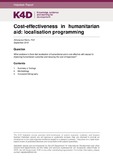| dc.description.abstract | There is consensus in the humanitarian aid literature that localisation costs less and can have greater impact on areas in need because the staff of local and national actors cost less compared to the staff of international actors and because staff of local and national actors are more aware of local contexts offering tailor-made solutions. However, the literature does not provide robust evidence showing how localisation is cost-effective. The only tangible evidence relates to particular case studies, such as Myanmar and DRC (Groupe URD, 2017) and Philippines and Nepal (Islamic Relief, 2017). In these cases, the cost of national and local responses was significantly lower and the results very positive. The key elements the success was that the staff of the local actors cost less, were easily deployed, and had good knowledge of the cultural context they were operating in. The literature is more concerned with how localisation, which is accepted as the optimal solution for humanitarian aid in cost-effectiveness terms, can function to the highest international standards and have greater impact on the ground (Oxfam, 2017; Saferworld, 2018). The literature mainly debates facilitating and enabling factors for the overall effectiveness of localisation (Building Markets, 2018; Global Mentoring Initiative, 2018) and what can possibly hinder it or even tarnish its positive image (Oxfam, 2017). Accordingly, the literature focuses on establishing a conflict sensitive approach vis-à-vis the promotion of localisation given that good knowledge of the local context and good access to conflict areas might come with the danger that local actors become part of the conflict as they might well have certain preferences, interests and biases (Oxfam, 2017; Saferworld, 2018). The literature also discusses which local actors specifically can be the most effective, with some reports arguing that international actors should be open to the idea of collaborating with informal local actors under certain conditions (Overseas Development Institute, 2018). Finally, the literature refers to other advantages of localisation, such as access and agility in difficult or unsafe areas (Groupe URD, 2017; Humanitarian Policy Group, 2018) that are not directly related to cost-effectiveness, but do relate to the belief that local and national actors can be more effective and impactful in areas of humanitarian need. | en |

